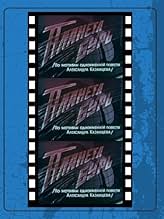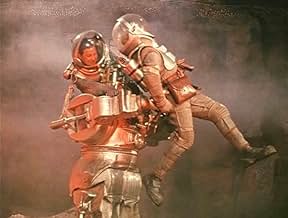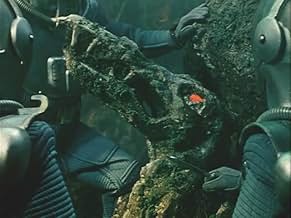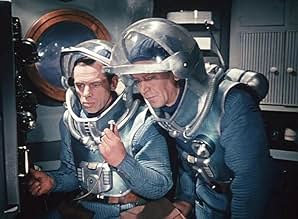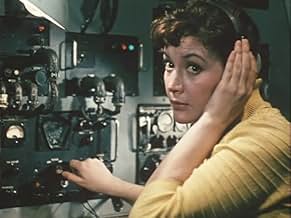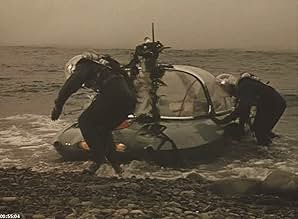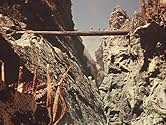CALIFICACIÓN DE IMDb
6.3/10
1.6 k
TU CALIFICACIÓN
Agrega una trama en tu idiomaCosmonauts land on the planet Venus. However, they find themselves in danger from the voracious monsters they find on it.Cosmonauts land on the planet Venus. However, they find themselves in danger from the voracious monsters they find on it.Cosmonauts land on the planet Venus. However, they find themselves in danger from the voracious monsters they find on it.
- Dirección
- Guionistas
- Elenco
- Dirección
- Guionistas
- Todo el elenco y el equipo
- Producción, taquilla y más en IMDbPro
Opiniones destacadas
Pavel Klushantsev, who directed more Russian SF films than he's credited with here, found himself propelled from obscurity into sudden demand by the Soviet authorities when the production of his 1958 SF debut, 'Road to the Stars' coincided with the launch of Sputnik. Although he languished in almost total obscurity in the West, his films were enormously popular in the USSR, and, as a recent documentary noted, many of his cinematic innovations were 'borrowed' 10 years later by Kubrick in '2001'.
Planet of Storms is not a great movie, but compared with most of the SF which the USA was churning up to this time, it's positively stellar. It's weakest points are its sketchy characterisations, and rather poor pacing, but hard SF luminaries like Gernsback and John Campbell would probably have admired its attention to detail, and relative lack of sensationalism. The film actually begins with the disclaimer "Venus may well be entirely different to this" (or somesuch), and what follows is a serious attempt to depict a Venusian expedition - marred perhaps by the odd dinosaur, but surprisingly free of Soviet chest-thumping.
Planet of Storms won't blow your mind, but you'll find yourself being charmed by the ingenious photography, sets, creatures, etc. There's also a straight out hilarious scene where the Robot gets rained on, and goes off his head. While his two human companions are lying on the ground, dangerously ill from fever, he's babbling on about building a concrete highway to reach the other half of the expedition, who are are about 20 miles away. Contacting him via radio, they are somewhat alarmed to hear him tell them "According to quotes from the Smith corporation, the cost of building a highway to the Sirius is 37 million dollars". I don't know if this was a dig at capitalism, but it cracked me up anyway.
Now - some bloke wanted a translation of the lyrics to the song. These are courtesy of SBS TV Australia (translated by Elena Mikrailik and Brendan Doyle)
(first version)
Planet of Storms, we thank you for your lessons / We enjoyed our stay, but now we must be gone / Our ship awaits; our way is clear and straight / Our hearts are calling, "home, home home" / Yes, home, dear Comrades //
It's time to calculate the points of bearing / It's time to place our courage at the helm / She waits for us, the planet of our birth / Our dear home; our one and only Earth / Yes, Earth / Earth, dear Comrades //
(end of movie version)
Planet of Storms, we'll see you soon, don't worry / And in your harbour, our ships will gladly berth / For not in vain are we the sons of Earth / For not in vain are we the sons of Earth / Earth, dear Comrades
Planet of Storms is not a great movie, but compared with most of the SF which the USA was churning up to this time, it's positively stellar. It's weakest points are its sketchy characterisations, and rather poor pacing, but hard SF luminaries like Gernsback and John Campbell would probably have admired its attention to detail, and relative lack of sensationalism. The film actually begins with the disclaimer "Venus may well be entirely different to this" (or somesuch), and what follows is a serious attempt to depict a Venusian expedition - marred perhaps by the odd dinosaur, but surprisingly free of Soviet chest-thumping.
Planet of Storms won't blow your mind, but you'll find yourself being charmed by the ingenious photography, sets, creatures, etc. There's also a straight out hilarious scene where the Robot gets rained on, and goes off his head. While his two human companions are lying on the ground, dangerously ill from fever, he's babbling on about building a concrete highway to reach the other half of the expedition, who are are about 20 miles away. Contacting him via radio, they are somewhat alarmed to hear him tell them "According to quotes from the Smith corporation, the cost of building a highway to the Sirius is 37 million dollars". I don't know if this was a dig at capitalism, but it cracked me up anyway.
Now - some bloke wanted a translation of the lyrics to the song. These are courtesy of SBS TV Australia (translated by Elena Mikrailik and Brendan Doyle)
(first version)
Planet of Storms, we thank you for your lessons / We enjoyed our stay, but now we must be gone / Our ship awaits; our way is clear and straight / Our hearts are calling, "home, home home" / Yes, home, dear Comrades //
It's time to calculate the points of bearing / It's time to place our courage at the helm / She waits for us, the planet of our birth / Our dear home; our one and only Earth / Yes, Earth / Earth, dear Comrades //
(end of movie version)
Planet of Storms, we'll see you soon, don't worry / And in your harbour, our ships will gladly berth / For not in vain are we the sons of Earth / For not in vain are we the sons of Earth / Earth, dear Comrades
If one wants to learn some Russian (which I would like to do if I could find the time), then this film would give some insights.
I bought the version from Sinister Cinema which seems to be missing the first half and so it starts with the cosmonauts discussing a tragic collision in space as they prepare to embark on a trip to Venus. It is in Russian with English subtitles and the special effects and the background music are both awesome. The story is pretty straight forward about a Russian expedition to the planet Venus, their encounter with dinosaurs and other strange life forms, philosophical discussions about the role of man in space, speculation about extraterrestrial intelligent life, and an ironic ending in which intelligent humanoid life is shown to exist on Venus, yet there is no contact between them and earth-born humans. Perhaps the writers intended a sequel.
Just like a lot of the German films from the 1930s, there is very little or no ideological propaganda, even though there is one reference to the Communist Party, Government, and the Soviet Union (thankfully a thing of the past). But aside from that single sentence, there is no reference to anything political. The story centers around a group of cosmonauts that represent not just Russia, but all of humanity as a whole as the crew embarks on an exploratory mission of the planet Venus. Recommended highly.
Dan Basinger
I bought the version from Sinister Cinema which seems to be missing the first half and so it starts with the cosmonauts discussing a tragic collision in space as they prepare to embark on a trip to Venus. It is in Russian with English subtitles and the special effects and the background music are both awesome. The story is pretty straight forward about a Russian expedition to the planet Venus, their encounter with dinosaurs and other strange life forms, philosophical discussions about the role of man in space, speculation about extraterrestrial intelligent life, and an ironic ending in which intelligent humanoid life is shown to exist on Venus, yet there is no contact between them and earth-born humans. Perhaps the writers intended a sequel.
Just like a lot of the German films from the 1930s, there is very little or no ideological propaganda, even though there is one reference to the Communist Party, Government, and the Soviet Union (thankfully a thing of the past). But aside from that single sentence, there is no reference to anything political. The story centers around a group of cosmonauts that represent not just Russia, but all of humanity as a whole as the crew embarks on an exploratory mission of the planet Venus. Recommended highly.
Dan Basinger
Not bad, not incredible like "Forbidden Planet" and not as colourful and tragic as "This Island Earth" and it is certainly not "Solaris". But we must give 60s Eastern bloc science fiction its due. None of it is bad. All of it respects the intelligence of the viewers and each manages to create effective atmospheres. The music and background sound were good. The robot and the "supercar" are dated but very good for the time. Naming the robot "John" is a bit of a dig at the West (one could just as easily see Westerners naming a robot Ivan or Igor). The robot is given a Western name while the crew are all self actualized socialist men except for the woman cosmonaut who is given the traditional role of minding the mothership and lamenting over the fate of the men who are off exploring the planet. If that and the song are the social commentary then it could have been much worse.
It doesn't compare with modern day films at all, but then one shouldn't try to, should one? Gee they all (and probably "we too") took themselves so seriously those days!!
I'm confused by one previous commentator who said the film was in black and white. Maybe her TV was, but the film as I saw it last night certainly was in colour (well, 1960s colour, anyway).
One quote from the film certainly is worth commenting. That's where they are speculating that there may have been creatures who crashed their spaceship a long time ago and then turned feral. The character comments that they would have had "no culture". Well, that's the Eastern European way, isn't it? Culture is so important; but what they can't seem to perceive, so useless. As author Stephen Coonts said of the Russians: "They can all write poetry but not a single one of them can change a light bulb" (well something like that, anyway).
But putting that to one side, yes a most interesting and well-made film of its time. The singing absolutely blew me away. Not the quality of the singing, I mean the fact that they had singing at all in what otherwise seems to me such a "serious" movie!
I'm confused by one previous commentator who said the film was in black and white. Maybe her TV was, but the film as I saw it last night certainly was in colour (well, 1960s colour, anyway).
One quote from the film certainly is worth commenting. That's where they are speculating that there may have been creatures who crashed their spaceship a long time ago and then turned feral. The character comments that they would have had "no culture". Well, that's the Eastern European way, isn't it? Culture is so important; but what they can't seem to perceive, so useless. As author Stephen Coonts said of the Russians: "They can all write poetry but not a single one of them can change a light bulb" (well something like that, anyway).
But putting that to one side, yes a most interesting and well-made film of its time. The singing absolutely blew me away. Not the quality of the singing, I mean the fact that they had singing at all in what otherwise seems to me such a "serious" movie!
The russian language version is rare, but well worth seeing. If you're really curious, you can see the American version which was retitled "Voyage to the prehistoric planet" and released in 1966. Back in the early 1960s, when this film was made, the Soviets had focused thier space program on Venus. In fact, they were the first to send probes into the atmosphere, land successfully, and return pictures from the surface. It's no wonder they were inspired to produce an extravagant adventure, based on the promise of thier exploration. The story is basic and straight forward, about an expedition to the planet Venus, but the science is flawed. They encounter oceans, flooding rains, and animal life. When this film was produced, we were just beginning to discover the truth about Venus. A surface temperature at the melting point of lead. A poisinous atmospere, with crushing pressure hundreds of times as heavy as ours. No water, or oxygen, and sulfuric acid in the clouds. If you're lucky enough to run across this film, forget all that, suspend you disbelief, and enjoy this rare classic gem.
¿Sabías que…?
- TriviaThis movie is later edited and dubbed as "Voyage to the Prehistoric Planet", released in the US in 1965. This movie (and the Russian inserts) were in turn used to create "Voyage to the Planet of Prehistoric Women" (1968)
- Versiones alternativasFor the U.S. version, titled Voyage to a Prehistoric Planet (1965), all footage of Kyunna Ignatova has been removed and replaced with footage of American actress Faith Domergue playing the same part.
- ConexionesEdited into Voyage to the Prehistoric Planet (1965)
Selecciones populares
Inicia sesión para calificar y agrega a la lista de videos para obtener recomendaciones personalizadas
- How long is Planeta bur?Con tecnología de Alexa
Detalles
- Tiempo de ejecución1 hora 18 minutos
- Mezcla de sonido
- Relación de aspecto
- 1.37 : 1
Contribuir a esta página
Sugiere una edición o agrega el contenido que falta

Principales brechas de datos
By what name was El planeta de las tormentas (1962) officially released in Canada in English?
Responda
